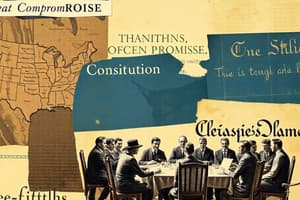Podcast
Questions and Answers
What agreement did the delegates reach regarding enslaved people and representation with the Three-Fifths Compromise?
What agreement did the delegates reach regarding enslaved people and representation with the Three-Fifths Compromise?
- They were not to be counted in the census at all.
- They were counted in the census in certain states.
- They were counted in the census as full equals.
- They were partially counted in the census. (correct)
Which was an area of weakness in the federal government under the Articles of Confederation?
Which was an area of weakness in the federal government under the Articles of Confederation?
- Legislative power (correct)
- Authoritative power
- Democratic power
- Regulatory power
If leaders wanted to create a government that is more effective than the government under the Articles of Confederation, which is the most important idea that should be embraced?
If leaders wanted to create a government that is more effective than the government under the Articles of Confederation, which is the most important idea that should be embraced?
- The federal and state governments should be equal.
- The federal government must have an elected leader.
- The state governments should be weak.
- The federal government cannot be weak. (correct)
In a confederal system of government, power is
In a confederal system of government, power is
Which statement about the Three-Fifths Compromise is accurate?
Which statement about the Three-Fifths Compromise is accurate?
When leaders use religious laws to govern, they most likely represent:
When leaders use religious laws to govern, they most likely represent:
What was the purpose of the New Jersey Plan?
What was the purpose of the New Jersey Plan?
Which scenario is not guaranteed under the Articles of Confederation?
Which scenario is not guaranteed under the Articles of Confederation?
Which type of governmental power does a unitary system hold?
Which type of governmental power does a unitary system hold?
In a unitary system of government, power is
In a unitary system of government, power is
Which best describes an important civic responsibility?
Which best describes an important civic responsibility?
A public welfare service that the US government provides is
A public welfare service that the US government provides is
The US Constitution structures the government by creating a system that
The US Constitution structures the government by creating a system that
Study Notes
Three-Fifths Compromise
- Delegates decided to partially count enslaved people in the census, with each enslaved individual counting as three-fifths of a person.
- This agreement aimed to balance the representation of slave and free states in Congress.
Articles of Confederation Weaknesses
- Lacked regulatory and authoritative power, leading to ineffective legislation.
- Federal government could not raise revenue or impose taxes without state approval.
- State and national currencies caused economic competition and instability.
Effective Government Formation
- To improve governance beyond the Articles of Confederation, the federal government needed to be strong and effective.
- Establishing a strong federal leader was deemed critical for operational efficiency.
Confederal and Unitary Systems
- In a confederal system, power is distributed among state governments rather than centralized.
- A unitary system centralizes power within a single central government, limiting state autonomy.
New Jersey Plan
- Proposed to support smaller states’ interests by ensuring equal representation regardless of population size.
Civic Responsibilities and Governance
- Voting is identified as a key civic responsibility essential in a democratic society.
- The U.S. government provides public welfare services, notably education, for societal benefit.
US Constitution Structure
- The Constitution organizes government power across federal, state, and local levels, establishing a framework for functioning governance.
Studying That Suits You
Use AI to generate personalized quizzes and flashcards to suit your learning preferences.
Description
This quiz explores the foundational concepts of the U.S. government, including the Three-Fifths Compromise and the weaknesses of the Articles of Confederation. It discusses the necessity for a strong federal government and the differences between confederal and unitary systems. Test your understanding of these key political concepts.





